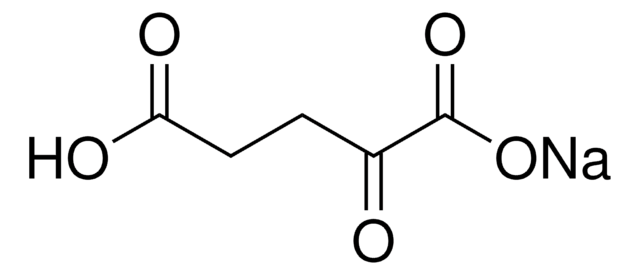SML2205
Octyl-α-KG
≥95% (HPLC)
Synonym(e):
α-KG octyl ester, α-Ketoglutarate octyl ester, 1-Octyl-2-Oxo-pentanedioate, 1-Octyl-2-ketoglutarate, 2-Oxo-pentanedioic acid, 1-octyl ester, Octyl-α-ketoglutarate, Octyl-2KG
About This Item
Empfohlene Produkte
Assay
≥95% (HPLC)
Form
oil
Lagerbedingungen
desiccated
under inert gas
Farbe
colorless to yellow
Lagertemp.
−20°C
SMILES String
CCCCCCCCOC(C(CCC(O)=O)=O)=O
Anwendung
Biochem./physiol. Wirkung
Lagerklassenschlüssel
11 - Combustible Solids
WGK
WGK 3
Flammpunkt (°F)
Not applicable
Flammpunkt (°C)
Not applicable
Analysenzertifikate (COA)
Suchen Sie nach Analysenzertifikate (COA), indem Sie die Lot-/Chargennummer des Produkts eingeben. Lot- und Chargennummern sind auf dem Produktetikett hinter den Wörtern ‘Lot’ oder ‘Batch’ (Lot oder Charge) zu finden.
Besitzen Sie dieses Produkt bereits?
In der Dokumentenbibliothek finden Sie die Dokumentation zu den Produkten, die Sie kürzlich erworben haben.
Kunden haben sich ebenfalls angesehen
Unser Team von Wissenschaftlern verfügt über Erfahrung in allen Forschungsbereichen einschließlich Life Science, Materialwissenschaften, chemischer Synthese, Chromatographie, Analytik und vielen mehr..
Setzen Sie sich mit dem technischen Dienst in Verbindung.











